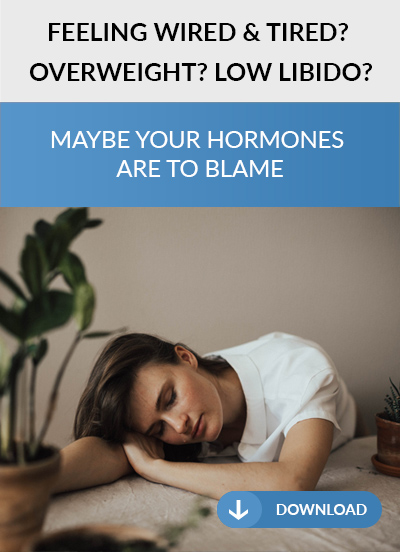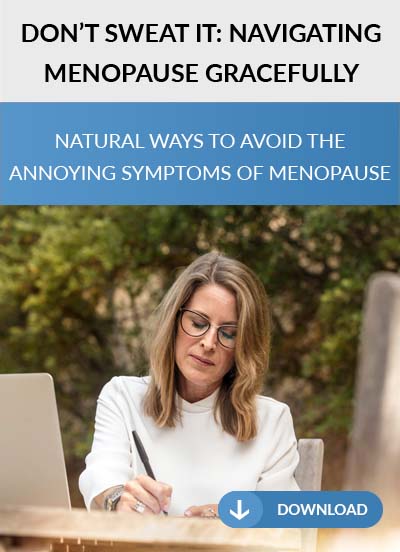Worried about the risks of hormone replacement therapy?
You’ve probably heard that hormones cause breast cancer, which is pretty scary. The truth is estrogen does NOT increase breast cancer, and for most women the benefits of estrogen replacement far outweigh the risks!
Without hormone replacement, you are at risk for symptoms like hot flashes and vaginal dryness, but that is just the tip of the iceberg. There is a long list of other symptoms that you may not even connect with menopause, including fatigue, depressed mood, irritability, poor sleep, bad memory, changes in your hair, your skin, your sex life and the shape of your body! These problems don’t just affect you – when you’re not at your best it can affect your relationships, your work performance and your quality of life!
Many women put up with menopausal symptoms because they are afraid of the risks of hormone replacement. Sadly the risks of estrogen have been over-stated, mis-construed and mis-understood resulting in unnecessary suffering.
Did you know that consistently, across many studies, estrogen replacement has been shown to DECREASE the risk of breast cancer? That is not a typo, I did mean to say decrease (as in lower, reduce, diminish…). Estrogen has also been shown to reduce the risk of heart attacks and death!
But wait a minute, how many times have you heard that it increases risks? How can this be?Lets go through the research and you’ll see for yourself.
The Women’s Health Initiative Trial (WHI) Started the controversy
The Women’s Health Initiative Trial (or WHI) was published in 2002. Prior to this study there were many studies (done over many years) that showed many benefits of estrogen, including protecting your heart, brain and bones.The WHI found that women on hormones had an increase in the risk for breast cancer, and turned everything we knew about hormone replacement on its head. Millions of women (and their doctors) suddenly saw hormones as dangerous and something to be avoided. But was this interpretation accurate?
The WHI was a very large, expensive study in which women were given estrogen replacement. The estrogen they used was derived from the urine of pregnant horses, and was not bio-identical, meaning it wasn’t exactly the same as the estrogen that your ovaries make.Some women also got a synthetic form of progesterone (“progestin”).It turns out that the progestin was the real problem but for now, lets focus on estrogen, since that’s the hormone that got a bad rap.
Here is what we know
Estrogen is good for your bones (it helps reduce the risk of osteoporosis) and is the most effective therapy for hot flashes. These facts are not in question. But why are we so scared of estrogen?
Here is what the WHI results showed:
Women who started estrogen replacement (ERT) between age 50-59 had LESS Heart disease, LESS strokes, LESS breast cancer, and LESS risks of death.
Women who started ERT between age 60-69 had LESS heart disease and LESS breast cancer, but they had a slightly increased risk of blood clots and stroke. There was no increase or decrease in overall deaths.
Women who started ERT between ages 70-79 had increased blood clots, stroke and heart disease, and increased overall mortality, but STILL no increase in breast cancer.
Did you catch that? There was no increase in breast cancer (in fact for women under 70 there was LESS risk). This data is from the same WHI study that trumpeted all over the news that hormones increase breast cancer!
So why does everyone “know” that hormone replacement causes breast cancer?
Here’s where that message came from…
Women in the study were divided into 2 groups.One group of women had previously had a hysterectomy, and they received estrogen (ERT) with the results we saw above (no increase in breast cancer).
The other group of women still had their uterus, so they were give progesterone to protect their uterus from the effect of estrogen replacement. The pill they were given contained a synthetic version of progesterone (a “progestin”) which is not bio-identical (not the same as the progesterone their ovaries used to make) and this group of women had a slight increase in breast cancer rates.
Sometimes numbers can seem worse than they are….
The media proclaimed that the WHI found a 26% increase in breast cancer in women on hormone replacement (remember this was only true in the group of women taking synthetic progestins).While it sounds pretty scary, this doesn’t mean you have a 26% chance of getting breast cancer.In absolute numbers, for every 1,000 women taking estrogen/progestin there was 1 extra case of breast cancer (0.9 extra cases to be exact). I’m not recommending the use of synthetic progestin, but 1 extra case per 1000 women doesn’t sound like a huge increase in the risk.In fact the numbers were re-examined several years later and not found to be statistically significant (in other words, the slight increase in this group of women could have just been due to chance)
Other studies have shown that if estrogen is given with bio-identical progesterone (the same form of progesterone as your ovaries used to make) there is NO increase in the risk of breast cancer.
Hormone replacement has important benefits!
Lets look at some of the studies that showed the benefits of hormone replacement.
- A Danish study of 1000 women found a 50% reduction in heart attacks, heart failure and death in women on hormone replacement.Women on estrogen only (the ones without a uterus) had a decrease in breast cancer, women on combined estrogen/progestin had no increase in breast cancer.In total, 26 women in the control group died, compared with 15 women on HRT = 42% reduction in the risk of death in the women on hormone replacement.
Effect of hormone replacement therapy on cardiovascular events in recently postmenopausal women: randomised trial.BMJ 2012; 345 doi: http://dx.doi.org/10.1136/bmj.e6409
- Researchers in Finland looked at the effect of estradiol (bio-identical estrogen) on longterm health in postmenopausal women.Almost half a million women were studied.The results were pretty convincing. Risk of all cause mortality (death from ANY cause) was reduced by 12-28%; the longer the women used the hormones, the lower their risk of death.In absolute numbers, there were 19 fewer heart disease deaths and 7 fewer stroke deaths per 1000 women using hormone replacement for at least 10 years.
Menopause. 2015 Mar 23.
- “Over-interpretation and misrepresentation of the WHI findings have damaged the health and well-being of menopausal women by convincing them and their health professionals that the risks of HT outweigh the benefits.”
Climacteric. 2014 Jun;17(3):215-22.
- “For healthy women aged 50-59 years, estrogen therapy decreases coronary heart disease and all-cause mortality”
Climacteric. 2014 Oct;17(5):540-56.
- “Breast cancer risk increased marginally with estrogen/progestogen therapy, related to duration of use, but with estrogen-alone therapy, breast cancer risk decreased significantly, as did mortality. For younger women receiving estrogen alone, there is great consistency between all randomized trials, including the WHI and observational data showing a coronary benefit and a decrease in all-cause mortality.”
Climacteric. 2014 Dec;17 Suppl 2:12-7.
- “In this paper, we review data supporting the use of HT administered to postmenopausal women, showing it to have more benefit than risk for symptom control, prevention of bone mineral loss and fracture, and improvement of the metabolic profile in women who began HT when they were less than 60 years of age and had their last menstrual period less than ten years previous. In hysterectomized women treated with estrogen only, a reduction in breast cancer risk was noted in all age groups”
J Steroid Biochem Mol Biol. 2014 Jul;142:4-11.
- “Unlike oral estrogens, transdermal estradiol has been shown not to increase the risk of blood clot or stroke, and to confer a significantly lower risk for gallbladder disease. Unlike some progestogens, [bioidentical] progesterone is also not associated with an increased risk of blood clot, or with an increased risk of breast cancer. “
Climacteric 2012;15(Suppl 1):3–10
And here is one more study…
This study shows just how much harm we have done by unnecessarily misinforming (and scaring) women and their doctors. It is pretty shocking….
- A Yale study found that estrogen therapy was associated with a reduction in deaths from heart attacks and breast cancer in women aged 50-59 who had had a hysterectomy. The authors estimated that 90,000 women have died because they did NOT continue to take hormone replacement therapy after the WHI study was published.
The Mortality Toll of Estrogen Avoidance: An Analysis of Excess Deaths Among Hysterectomized Women Aged 50 to 59 Years. Sarrell et al American Journal of Public Health: September 2013, Vol. 103, No. 9, pp. 1583-1588.
The facts….
Hormone replacement has important benefits for women. There is no need to suffer with symptoms of hormone imbalance due to fear! Empower yourself with information, and you can feel like yourself again!
If you have questions, please call to talk to a member of our team at 704-752-9346 or email us at questions@signaturewellness.org. You deserve to LOVE the way you feel!





